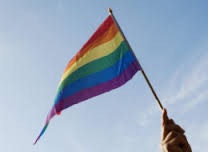
Alabama State University, Spelman College, Johnson C. Smith University and Tennessee State University were recently awarded $4,000 grants for on-campus screenings of “The New Black,” a new film that examines the role of race, faith, justice and identity in the lives of politically powerful Marylanders leading into the 2013 election—which included a referendum to legalize same-sex marriage in the state. Grant awardees are hoping the discussions in the film will serve as a catalyst for discussions on campus that will lead to a more inclusive environment.
“’The New Black’ is our first step towards creating greater visibility, establishing a safe space, and providing support for LGBT Hornets amongst faculty and the student body,” said Darian Aaron, president of AMPLIFIED, the LGBT organization at Alabama State University. “Our goal is to create a campus environment where the totality of our identity is celebrated in culture and university policy.”
Warren Radebe, a senior at Johnson C. Smith University and vice president of S.A.F.E. Pride—the campus’ LGBTQ and human rights organization—said that HBCUs must foster a more inclusive environment if they are to remain relevant in the 21st century. Citing the recent closure of St. Paul’s College and reports of other schools flailing, Radebe believes “that would never happen” if Black LGBTQ students-to-be felt there weren’t such a closed-off culture on HBCU campuses.
When preparing to apply for schools, prospective students “look at what can this school do for me, how can it support my issues,” he said, noting that for many, their “issues” revolve around their sexual identity and acceptance. PWIs, he said, tend to be much more liberal and thus more supportive of LGBTQ students than HBCUs, many of which have very conservative foundations.
Aaron agreed.
“These conversations are necessary if HBCUs want to remain relevant and competitive in the 21st Century,” he said. “HBCUs have always been on the forefront in the advancement of civil rights, and if they are serious about creating a world where African-American students are prepared to succeed during school and after graduation their plan must include their LGBT students as well.”














